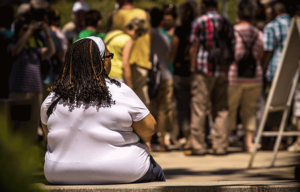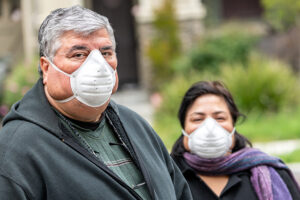
The risk of developing severe COVID-19 increases significantly with age. But since the pandemic began, there is mounting evidence that many of the most serious cases of the disease involve people with obesity—even if they’re young.
Nearly half of American adults (42.4 percent) are obese, according to the Centers for Disease Control and Prevention (CDC). Meanwhile, 9.2 percent of Americans have severe obesity.
The obesity epidemic stems from many causes, such as where people live as well as their income level and ability to exercise. Whether or not people have access to healthy food or if anyone in their family has obesity can also increase risk. Taking medications that can result in weight gain could also contribute. This complexity means losing weight can be tough. It also makes this epidemic hard to fix.
But why does obesity make people more vulnerable to severe COVID-19 infection? And what can you do about it?
People with severe COVID-19 often have chronic health issues linked to obesity, including heart disease and diabetes. But obesity, itself, counts as one of the underlying medical conditions that increases the risk for more serious infection. It also ranks among the top risk factors for hospitalization with the disease.
By definition, obesity develops when people’s weight is greater than what is considered healthy for their height. Body mass index (BMI) is a measure used to help determine if someone is obese. It’s calculated by dividing your weight in kilograms by your height in meters squared.
– Overweight: BMI of 25 to less than 30
– Obese: BMI of 30 to less than 40
– Severely obese: BMI of 40 or higher

People with obesity may have triple the risk of hospitalization with COVID-19, compared to people without obesity, the CDC reports. Being severely obese may increase the risk by 4.5 times.
A July 2020 analysis of 75 studies in Asia, Europe and North and South America published in Obesity Reviews also found that people with obesity who were hospitalized with COVID-19 had 74 percent increased risk of admission to an intensive care unit (ICU) and 48 percent increased risk of death, compared to people without obesity. This risk was most striking among men and those aged 60 years or younger.
Being young may not offset the risk
While older age is a risk factor for more severe SARS-CoV-2 infections, being obese can spell trouble for younger people, too.
A September 2020 study of 3,222 young adults between 18 and 34 years old who were hospitalized with COVID-19 across the U.S. found that 36.8 percent had obesity, and 24.5 percent had severe obesity. The researchers found that severe obesity was associated with 2.3 times increased risk of mechanical ventilation or death, compared to not being obese. Moreover, the study showed that 52.5 percent of those with obesity and nearly 41 percent of those with severe obesity required mechanical ventilation or died.
Why obesity matters
Obesity may worsen COVID-19 for a few reasons. First, obesity often goes hand in hand with other medical conditions, such as high blood pressure and diabetes, which are also tied to more severe COVID-19.
Obesity can also affect lung capacity and function, making it harder for mechanical ventilation to work.
Having a larger body mass and larger waist circumference can make it more difficult for doctors to perform potentially life-saving procedures in the hospital, such as intubation, which is used to improve oxygenation of the lungs. Obesity also increases the risk for obstructive sleep apnea and other respiratory issues, which could lead to worse outcomes for those with COVID-19.
Obesity causes certain immune cells called T-cells, which help fight off infections, to not work as well as they should. So, these T-cells cannot fend off COVID-19 as well as they would in someone without obesity.
Ways to protect your health
It’s essential for everyone aged 6 months or older to get vaccinated against the flu. As concerns grow about a double threat of flu plus COVID-19.
Even if you come down with the flu after getting a flu shot, being vaccinated can decrease your chance of having a severe infection and being hospitalized.
Eat a healthy diet, engage in physical activity, get enough sleep and try to cope with stress—all of which may help with weight loss and improve immune function.
For many, this is easier said than done. Losing weight and getting enough exercise can be hard even in normal times. COVID-19 hasn’t made it any easier. But incorporating some small, manageable healthy adjustments into your routine is a start and could help.


